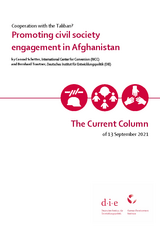The Current Column
Cooperation with the Taliban?
Promoting civil society engagement in Afghanistan
Schetter, Conrad / Bernhard TrautnerThe Current Column (2021)
Bonn: German Development Institute / Deutsches Institut für Entwicklungspolitik (DIE), The Current Column of 13 September 2021
This is a time when Afghan civil society cannot not be left to fend for itself. At the same time, it must be made clear to the Taliban that, unlike 20 years ago, today’s Afghan civil society has substantial influence and capacity for action. The Afghan population is not a bargaining chip to be used according to political whim, but rather has its own voice which now needs to be amplified.
Until it becomes clear whether the Taliban are prepared to follow up their promises of moderation, for instance in terms of employment for women, with action, it will take quite some signs of confidence from their side. Time will also tell whether, given its own diverse make-up, the Taliban is even able to guarantee people’s basic security and ensure the delivery of essential services in the country. The international community must decide whether it wants to wait and see what happens in this time or to adopt a proactive approach to shaping events in Afghanistan.
However, time is running out, with the humanitarian and economic situation of the population already having rapidly deteriorated since the beginning of the year. The food situation in the country ahead of winter is catastrophic due to crop failure and drought, and the Taliban also lack access to capital markets in the short term.
Negotiations on how and under what conditions the international community could cooperate with the Taliban are proving arduous. Given the devastating situation in the country, however, there is no time left to wait for the findings of analyses and consultations. The societal constraints that the Taliban is imposing on its own people are affecting women, minorities and human rights activists to a particularly great extent. Unless we want to completely jeopardise the development gains of the last 20 years and put our own long proclaimed values up for disposal, the country must not be left to descend into a humanitarian disaster, with fragmentation of society and intensive violent conflict.
Clearly, there is a need to massively step up the humanitarian assistance already announced, including in neighbouring states (especially Pakistan and Iran), which have for decades been destination countries for refugees from Afghanistan, in order to prevent further destabilisation of their societies. It is also necessary to adopt a financially resolute approach to cooperation that is clearly shaped by civil society and extends beyond humanitarian assistance. Unlike direct state cooperation, civil society cooperation, funded by national and international donors, no longer seeks to create and control a state based on the typical old model. The project of building a state in accordance with external requirements has quite evidently failed. Considerable donor funding was used to provide military protection for this endeavour. By contrast, very little finance was invested in building the administration and its capacities.
A civil-society approach involves working at local level in particular to try the opportunities available to civil society partners for shaping and implementing practical programmes and projects under the Taliban. International donors have these civil-society contacts and reliable networks; German political foundations alone work with several dozen of them. Whether it concerns politically innocuous topics such as well building, water/sewerage, sanitation, basic health care (WASH) and food security, or matters such as education, health and community building, it is especially important right now to make clear to the Taliban what kind of initiatives the international community is prepared to support. It is about engaging quickly in dialogue with decision-makers at local level, something which private aid organisations have been doing for years. While the Taliban certainly have a very long way to go in terms of equality, democracy and human rights, many projects launched by small NGOs show that it is possible to talk to, negotiate with local Taliban groups and have a continuous dialogue.
Providing rapid and clear support to civil society stakeholders in Afghanistan would also directly reveal the kind of compromises to which the Taliban are open. We do not need to wait for the Taliban to act and implement their policy throughout the country, but can be proactive instead. However, the crux of this approach is clear. On the one hand, it involves giving the Taliban the benefit of the doubt regarding their placatory statements that their future policies will be characterised by cooperation and moderation. On the other hand, it entails taking a risk that certain civil society visions can be implemented, while other concepts of key importance in development cooperation (such as gender equality) may fall by the wayside. Otherwise, a complete withdrawal from cooperation with Afghanistan would leave behind a disappointed civil society. Despite the risk, adopting this approach to civil society cooperation would be far more courageous and led by a genuine interest in the country, in regard to both the Afghan people and the Taliban, than pursuing a wait-and-see strategy and allowing the Taliban to set the agenda.
Prof. Dr Conrad Schetter has been researching on Afghanistan for 30 years. He is Director of the Peace and Conflict Research Institute BICC in Bonn.
Prof. Dr. Bernhard Trautner is a Political Scientist and Associate Researcher at the German Development Institute / Deutschen Institut für Entwicklungspolitik (DIE).
This text has been published as part of the series “Impulses for the Bundestag election”.


